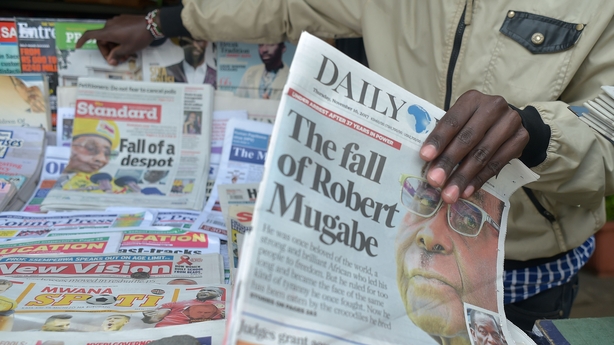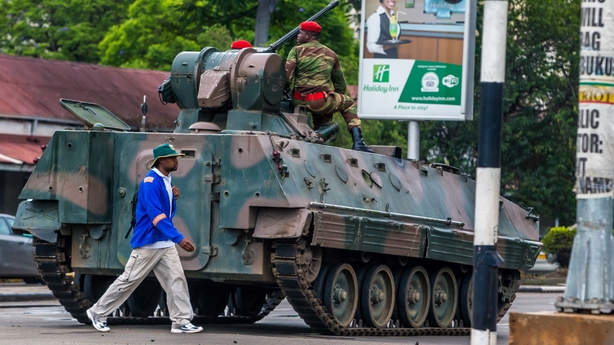Zimbabwean President Robert Mugabe's fate appears to hang in the balance as he is apparently refusing to step down, in the wake of an audacious seizure of power by the army.
The unfolding drama in the capital Harare was thrown into confusion when a smiling Mr Mugabe was pictured shaking hands with Zimbabwe's military chief, the man behind the military coup.
Mr Mugabe refused to immediately resign during talks with army generals who have taken control of the country.
Mr Mugabe was pictured meeting several of the generals at his lavish "Blue Roof" compound.
Army chief general Constantino Chiwenga and defence minister Sydney Tigere Sekeramayi were present at the meeting.
"They met today. He is refusing to step down. I think he is trying to buy time," said a source who declined to be named.
BREAKING: President Mugabe meets ZDF Commander and SA envoys at State House . https://t.co/Vtoumzd4rh pic.twitter.com/92V9Xijidj
— The Herald Zimbabwe (@HeraldZimbabwe) November 16, 2017
The United States is seeking "a new era" for Zimbabwe, the State Department's top official for Africa said, implicitly calling on President Mugabe to step aside as a political crisis mounts.
Acting Assistant Secretary of State for African Affairs Donald Yamamoto appeared to dismiss the idea of Mr Mugabe, who has ruled Zimbabwe for 37 years, remaining in a transitional or ceremonial role.
"It's a transition to a new era for Zimbabwe, that's really what we're hoping for," he said.
The army's takeover signalled the collapse in less than 36 hours of the security, intelligence and patronage networks that sustained Mr Mugabe through 37 years in power.
A priest mediating between Mr Mugabe and the generals, who seized power yesterday in what they called a targeted operation against "criminals" in Mr Mugabe's entourage, has made little headway, a senior political source told Reuters.
Opposition leader Morgan Tsvangirai called for Mr Mugabe's departure "in the interest of the people".
In a statement read to reporters, Mr Tsvangirai pointedly referred to him as "Mr Robert Mugabe", not President.


What is happening in Zimbabwe?
The army appears to want Mr Mugabe, who has ruled Zimbabwe since independence in 1980, to go quietly and allow a smooth and bloodless transition to Emmerson Mnangagwa, the vice president Mr Mugabe sacked last week triggering the political crisis.
The main goal of the generals is to prevent Mr Mugabe from handing power to his wife Grace who has built a following among the ruling party's youth wing and appeared on the cusp of power after Mr Mnangagwa was pushed out.
The last of Africa's state founders from the heyday of the struggle against European colonisation still in power, Mr Mugabe is still seen by many Africans as a liberation hero.
But he is reviled in the West as a despot whose disastrous handling of the economy and willingness to resort to violence to maintain power pauperised one of Africa's most promising states.
Once a regional bread-basket, Zimbabwe saw its economy collapse in the wake of the seizure of white-owned farms in the early 2000s, followed by runaway money-printing that catapaulted inflation to 500 billion percent in 2008.
Millions, from highly skilled bankers to semi-literate farmers, emigrated, mostly to neighbouring South Africa, where an estimated three million still live.
After a brief revival under a 2009-13 power-sharing government, when Mr Mugabe was forced to work with the opposition, the economy has once again cratered, with dollars scarce, inflation surging, imports running out and queues outside banks.

